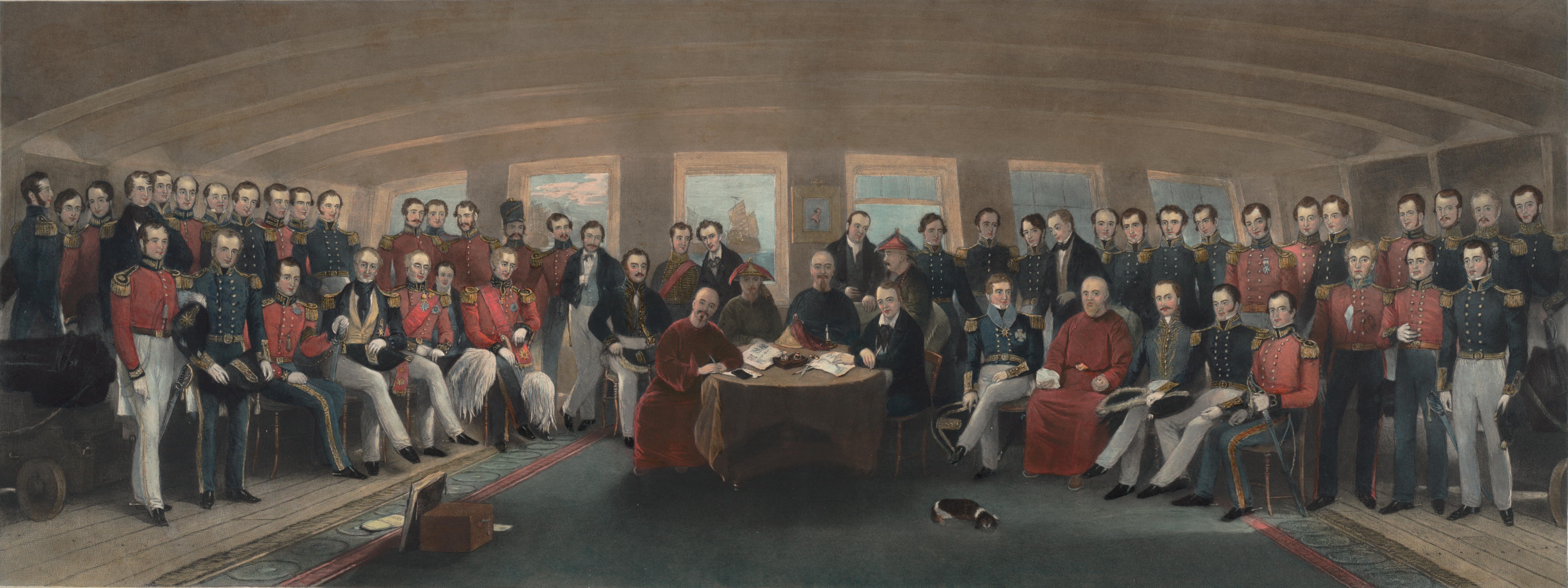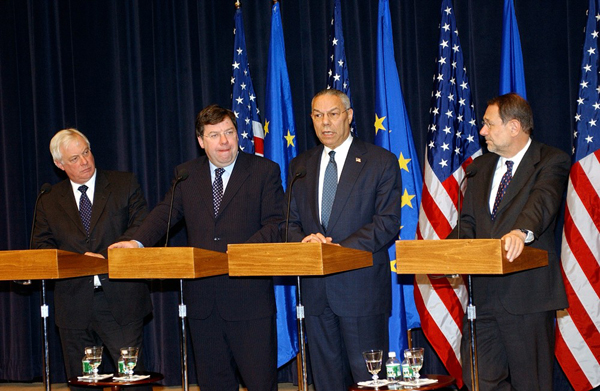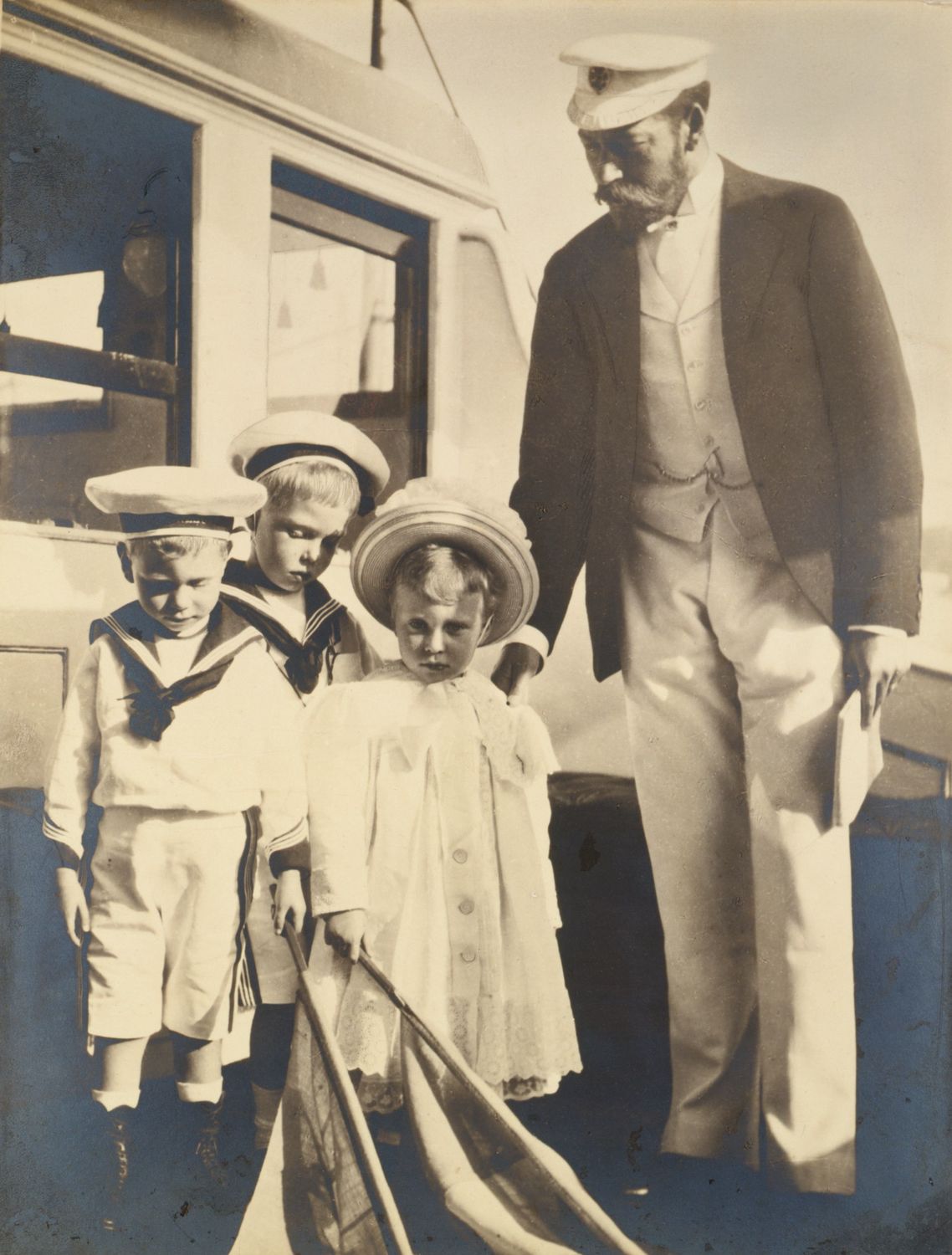|
British Hong Kong
Hong Kong was a colony and later a dependent territory of the British Empire from 1841 to 1997, apart from a period of occupation under the Japanese Empire from 1941 to 1945 during the Pacific War. The colonial period began with the British occupation of Hong Kong Island in 1841, during the First Opium War between the British and the Qing dynasty. The Qing had wanted to enforce its prohibition of opium importation within the dynasty that was being exported mostly from British India, as it was causing widespread addiction among its populace. The island was ceded to Britain by the Treaty of Nanking, ratified by the Daoguang Emperor in the aftermath of the war of 1842. It was established as a crown colony in 1843. In 1860, the British took the opportunity to expand the colony with the addition of the Kowloon Peninsula after the Second Opium War, while the Qing was embroiled in handling the Taiping Rebellion. With the Qing further weakened after the First Sino-Japanese War, ... [...More Info...] [...Related Items...] OR: [Wikipedia] [Google] [Baidu] |
Japanese Occupation Of Hong Kong
The Imperial Japanese occupation of Hong Kong began when the Governor of Hong Kong, Sir Mark Young, surrendered the British Crown colony of Hong Kong to the Empire of Japan on 25 December 1941. The surrender occurred after 18 days of fierce fighting against the overwhelming Japanese forces that had invaded the territory.Snow, Philip. 004(2004). The fall of Hong Kong: Britain, China and the Japanese occupation. Yale University Press. , .Mark, Chi-Kwan. 004(2004). Hong Kong and the Cold War: Anglo-American relations 1949â1957. Oxford University Press publishing. , . p 14. The occupation lasted for three years and eight months until Japan surrendered at the end of the Second World War. The length of this period (, ) later became a metonym of the occupation. Background Imperial Japanese invasion of China During the Imperial Japanese military's full-scale invasion of China in 1937, Hong Kong as part of the British empire was not under attack. Nevertheless, its situation ... [...More Info...] [...Related Items...] OR: [Wikipedia] [Google] [Baidu] |
Jews In Hong Kong
Jews were among the first settlers after Hong Kong became a British colony in 1841. The first Jews arrived in Hong Kong from various parts of the British Empire as merchants and colonial officials. Among the first wave, the Baghdadi Jews stood out especially, including representatives of the influential families of Sassoon and Kadoorie. The construction of the Ohel Leah Synagogue in 1901 marked the beginning of a fully fledged religious life for the city's local Jews. Hong Kong's Jewish community is able to freely practice most of their cultural and religious traditions, including holding Shabbat meals and celebrating the main Jewish holidays. The city currently has four active synagogues, three schools and a Jewish cemetery. Jews never constituted a large community in Hong Kong, only numbering a few hundred prior to World War II. Nevertheless, many influential Jews have left their mark on the city. Among them are: Matthew Nathan, the first and only Jewish governor of Hong ... [...More Info...] [...Related Items...] OR: [Wikipedia] [Google] [Baidu] |
Chief Secretary For Administration
The Chief Secretary for Administration, commonly known as the Chief Secretary of Hong Kong, is the most senior principal official of the Government of the Hong Kong Special Administrative Region. The Chief Secretary is head of the Government Secretariat which oversees the administration of the Region to which all other ministers belong, and is accountable for his or her policies and actions to the Chief Executive and to the Legislative Council. Under Article 53 of the Basic Law, the position is known as "Administrative Secretary". As the second highest ranking public official in Hong Kong, the Chief Secretary acts as Acting Chief Executive when the Chief Executive is absent. The Chief Secretary formulates and implements government policy, gives advice to the Chief Executive as a member of the Executive Council, and is responsible for managing the Government's relationship with the Legislative Council and drawing up the Government's legislative programme. The office (â ... [...More Info...] [...Related Items...] OR: [Wikipedia] [Google] [Baidu] |
Anson Chan
Anson Maria Elizabeth Chan Fang On-sang, (; ''nÊe'' Fang; born 17 January 1940) is a retired Hong Kong politician and civil servant who was the first ethnic Chinese and woman to serve as Chief Secretary, the second-highest position in both the British colonial government and the Hong Kong SAR government under the Chinese sovereignty from 1993 until she retired from the government in 2001, sparking speculations of her growing rift with Chief Executive Tung Chee-hwa. Enjoying wide popularity during her tenure and often dubbed as "Iron Lady" and the "Conscience of Hong Kong", Chan became increasingly outspoken about pushing for a faster pace of the democratisation in Hong Kong and defending the autonomy of Hong Kong. Supported by the pan-democracy camp, she stood in the 2007 Hong Kong Island by-election and briefly served as member of the Legislative Council.Vanessa Gould"The Iron Lady with a soft centre", ''The Standard'', 13 January 2001. After her retirement in 2008, she c ... [...More Info...] [...Related Items...] OR: [Wikipedia] [Google] [Baidu] |
George Alexander Malcolm
General George Alexander Malcolm, CB (21 January 1810 â 2 June 1888), was a British Army officer. He served in the First Anglo-Chinese War and became the first Colonial Secretary of Hong Kong in 1843. Career Malcolm was born in Bombay, India, on 21 January 1810. His father, Major-General Sir John Malcolm, was Governor of Bombay. His mother, Isabella Charlotte, was daughter of Lieutenant-General Sir Alexander Campbell. In 1841, Malcolm sailed to China as Secretary of Legation with Plenipotentiary Henry Pottinger during the First Anglo-Chinese War. On 29 August 1842, British and Chinese officials signed the Treaty of Nanking, which ended the war and ceded Hong Kong to Britain. After the Daoguang Emperor's assent for the treaty arrived in Nanking on 15 September, Malcolm sailed for London the next morning on board the steamer ''Auckland'' with a copy for ratification by Queen Victoria. He was made a Companion of the Order of the Bath on 24 December. After Pottinger became t ... [...More Info...] [...Related Items...] OR: [Wikipedia] [Google] [Baidu] |
Governor Of Hong Kong
The governor of Hong Kong was the representative of the British Crown in Hong Kong from 1843 to 1997. In this capacity, the governor was president of the Executive Council and commander-in-chief of the British Forces Overseas Hong Kong. The governor's roles were defined in the Hong Kong Letters Patent and Royal Instructions. Upon the end of British rule and the handover of Hong Kong to China in 1997, most of the civil functions of this office went to the chief executive of Hong Kong, and military functions went to the commander of the People's Liberation Army Hong Kong Garrison. The governor Authorities and duties of the governor were defined in the Hong Kong Letters Patent and Royal Instructions in 1843. The governor, appointed by the British monarch (on the advice of the Foreign Secretary), exercised the executive branch of the government of Hong Kong throughout British sovereignty and, with the exception of a brief experiment after World War II, no seriou ... [...More Info...] [...Related Items...] OR: [Wikipedia] [Google] [Baidu] |
Chris Patten
Christopher Francis Patten, Baron Patten of Barnes, (; born 12 May 1944) is a British politician who was the 28th and last Governor of Hong Kong from 1992 to 1997 and Chairman of the Conservative Party from 1990 to 1992. He was made a life peer in 2005 and has been Chancellor of the University of Oxford since 2003. Raised in west London, Patten studied history at Balliol College, Oxford. Shortly after graduating in 1965, he began working for the Conservative Party. Patten was elected Member of Parliament for Bath in 1979. He was appointed Secretary of State for the Environment by Margaret Thatcher in 1989 as part of her third ministry, becoming responsible for implementation of the unpopular poll tax. On John Major's succession as Prime Minister in 1990, Patten became Chairman of the Conservative Party and Chancellor of the Duchy of Lancaster. As party chairman, he successfully orchestrated a surprise Conservative electoral victory in 1992, but lost his own seat. P ... [...More Info...] [...Related Items...] OR: [Wikipedia] [Google] [Baidu] |
Henry Pottinger
Lieutenant-General Sir Henry Pottinger, 1st Baronet (; 3 October 1789 â 18 March 1856) was an Anglo-Irish soldier and colonial administrator who became the first Governor of Hong Kong. Early life Henry Pottinger was born at his family estate of Mount Pottinger in Ballymacarrett, County Down, Ireland, on 3 October 1789. He descended from the Pottingers of Berkshire, an old English family with a branch that settled in Ireland in the 17th century. He was the fifth son of Eldred Curwen Pottinger and his wife Anne. They had three daughters and eight sons. His nephew was also named Eldred Pottinger. Henry attended the Belfast Academy until the age of 12. In 1803, he left for India to join the East India Company's maritime service, but in the following year joined the Company's military service as a cadet instead. He studied local languages in Bombay and became an assistant teacher. On 18 September 1806, he was made an ensign and promoted to lieutenant on 16 July 1809.Broadfoot ... [...More Info...] [...Related Items...] OR: [Wikipedia] [Google] [Baidu] |
List Of British Monarchs
There have been 13 British monarchs since the political union of the Kingdom of England and the Kingdom of Scotland on 1 May 1707. England and Scotland had been in personal union since 24 March 1603. On 1 January 1801, the Kingdom of Great Britain and the Kingdom of Ireland merged, which resulted in the creation of the United Kingdom of Great Britain and Ireland, which became the United Kingdom of Great Britain and Northern Ireland on the secession of southern Ireland in the 1920s. List Queen Anne became monarch of the Kingdom of Great Britain after the political union of the Kingdom of England and the Kingdom of Scotland on 1 May 1707. She had ruled England, Scotland, and the Kingdom of Ireland since 8 March 1702. She continued as queen of Great Britain and Ireland until her death. Her total reign lasted 12 years and 147 days. During the reign of Queen Anne, Parliament settled the rules of succession in the Act of Settlement 1701, defining Sophia of Hanover (granddaughter o ... [...More Info...] [...Related Items...] OR: [Wikipedia] [Google] [Baidu] |
Elizabeth II
Elizabeth II (Elizabeth Alexandra Mary; 21 April 1926 â 8 September 2022) was Queen of the United Kingdom and other Commonwealth realms from 6 February 1952 until her death in 2022. She was queen regnant of 32 sovereign states during her lifetime, and was head of state of 15 realms at the time of her death. Her reign of 70 years and 214 days was the longest of any British monarch and the longest verified reign of any female monarch in history. Elizabeth was born in Mayfair, London, as the first child of the Duke and Duchess of York (later King George VI and Queen Elizabeth The Queen Mother). Her father acceded to the throne in 1936 upon the abdication of his brother Edward VIII, making the ten-year-old Princess Elizabeth the heir presumptive. She was educated privately at home and began to undertake public duties during the Second World War, serving in the Auxiliary Territorial Service. In November 1947, she married Philip Mountbatten, a former p ... [...More Info...] [...Related Items...] OR: [Wikipedia] [Google] [Baidu] |
George VI
George VI (Albert Frederick Arthur George; 14 December 1895 â 6 February 1952) was King of the United Kingdom and the Dominions of the British Commonwealth from 11 December 1936 until his death in 1952. He was also the last Emperor of India from 1936 until the British Raj was dissolved in August 1947, and the first Head of the Commonwealth following the London Declaration of 1949. The future George VI was born in the reign of his great-grandmother Queen Victoria; he was named Albert at birth after his great-grandfather Albert, Prince Consort, and was known as "Bertie" to his family and close friends. His father ascended the throne as George V in 1910. As the second son of the king, Albert was not expected to inherit the throne. He spent his early life in the shadow of his elder brother, Prince Edward, the heir apparent. Albert attended naval college as a teenager and served in the Royal Navy and Royal Air Force during the First World War. In 1920, he was made Duke ... [...More Info...] [...Related Items...] OR: [Wikipedia] [Google] [Baidu] |
Edward VIII
Edward VIII (Edward Albert Christian George Andrew Patrick David; 23 June 1894 â 28 May 1972), later known as the Duke of Windsor, was King of the United Kingdom and the Dominions of the British Empire and Emperor of India from 20 January 1936 until his abdication in December of the same year. Edward was born during the reign of his great-grandmother Queen Victoria as the eldest child of the Duke and Duchess of York, later King George V and Queen Mary. He was created Prince of Wales on his 16th birthday, seven weeks after his father succeeded as king. As a young man, Edward served in the British Army during the First World War and undertook several overseas tours on behalf of his father. While Prince of Wales, he engaged in a series of sexual affairs that worried both his father and then-British prime minister Stanley Baldwin. Upon his father's death in 1936, Edward became the second monarch of the House of Windsor. The new king showed impatience with court protocol, an ... [...More Info...] [...Related Items...] OR: [Wikipedia] [Google] [Baidu] |








